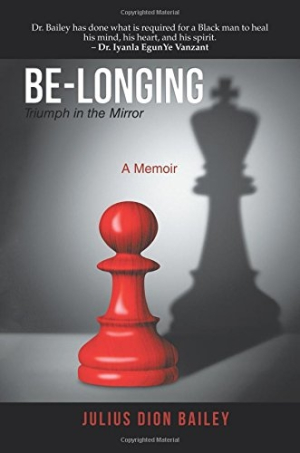Be-Longing
Triumph in the Mirror
Brave in its admission of past mistakes, this dark memoir finds hope for second chances.
Julius Dion Bailey’s coming-of-age memoir Be-Longing: Triumph in the Mirror is an exploration of what it means to be a black man in contemporary American society as well as an affecting, personal watershed. This lucid work highlights topics that range from sexuality to body image, love, and faith.
A philosopher who confronts himself at a crossroads, Bailey captures his loneliness and self-reckoning through his early experiences, which once defined his identity.
Bailey was born to a single mother on the South Side of Chicago. Early chapters detail his upbringing. He was an overweight child already engrossed with the power of language, and he despaired of a model for masculinity. He was first raised among women, including babysitters, and then with a stepfather in his maternal grandfather’s home. Eventually, he moved into a brick shotgun home with his mother.
He experienced numerous disappointments. His accounts range from those of abuse to humorous misadventures in parochial school, aptly revealing a wide search for belonging: “I wanted to be loved, not for the man I was pretending to be but for the boy I was.”
Such complexities center the book: the disconnect between Bailey’s projected confidence and deep-seated fears; the pull between the ivory tower and the seamier side of town. The result is a frank, vulnerable journey toward self-acceptance that stops short of complete resolution.
Organized around a succession of boyhood crushes, descriptions of collegiate dalliances, and flawed adult relationships, the book’s tone sometimes veers toward self-justification. Still, these accounts offer insight into how past experiences sometimes blind you to the future.
Encounters establish a pattern of harmful behavior but turn repetitive, particularly when they’re presented as straightforward, chronological events without enough hindsight to balance them. Such fixation also prevents a richer context from emerging.
When the writing forges connections to the outside world—as with mentions of music, the inclusion of notable figures like Cornel West, and forays into scenes like the solace of the bingo hall—there’s a stronger sense for the vivid panorama against which Bailey’s conflicts unfold.
Duplicity is drawn with especially biting accuracy. From working with a Christian pastor while still harboring less-than-Christian views to feigning sorrow to gain the sympathy of women, Bailey presents a version of himself that displays a heartrending destructiveness. Amid darker moments, pearls of wisdom stand out, including the realization that it is far more valuable to make an impact on others than it is to be important oneself.
Brave in its admission of past mistakes, this dark memoir finds hope for second chances.
Reviewed by
Karen Rigby
Disclosure: This article is not an endorsement, but a review. The publisher of this book provided free copies of the book and paid a small fee to have their book reviewed by a professional reviewer. Foreword Reviews and Clarion Reviews make no guarantee that the publisher will receive a positive review. Foreword Magazine, Inc. is disclosing this in accordance with the Federal Trade Commission’s 16 CFR, Part 255.

